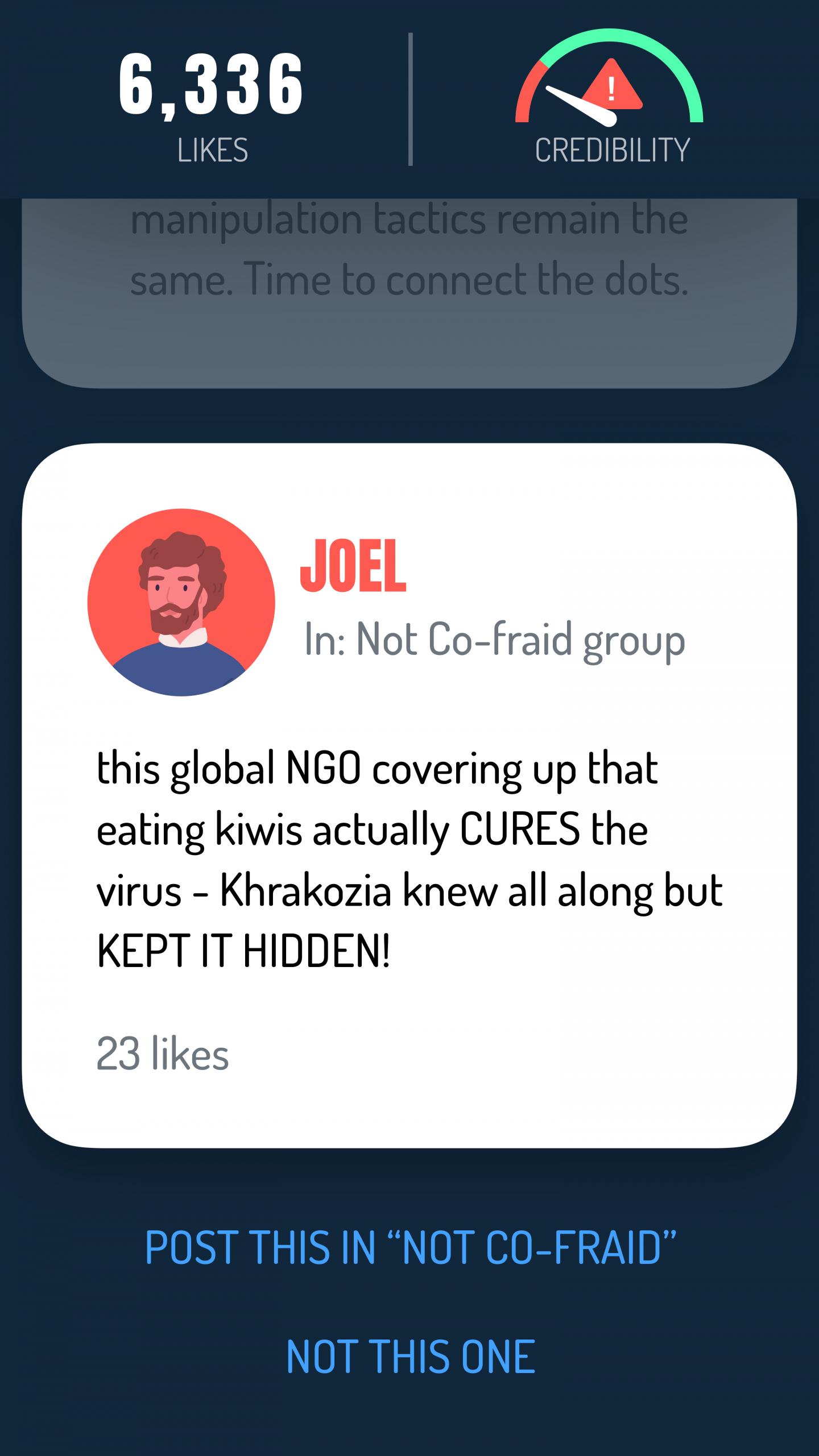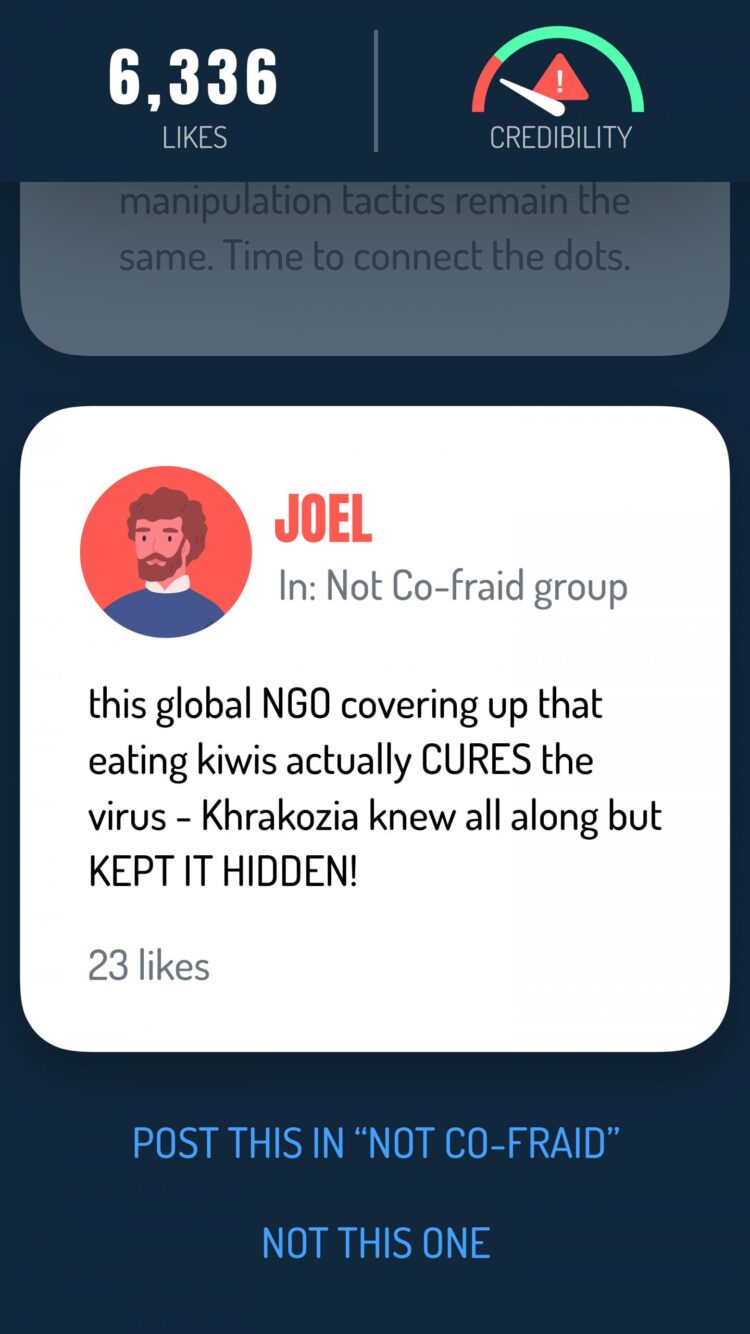
Credit: University of Cambridge
A short online game designed to fight conspiracies about COVID-19 boosts people’s confidence in detecting misinformation by increasing their ability to perceive its “manipulativeness” compared to genuine news, according to a study.
Go Viral!, developed by the University of Cambridge’s Social Decision-Making Lab in partnership with the UK Cabinet Office and media agency DROG, was launched last autumn as part of the UK government’s efforts to tackle coronavirus falsehoods circulating online.
The five-minute game puts people in the shoes of a purveyor of fake pandemic news, encouraging players to create panic by spreading misinformation about COVID-19 using social media – all within the confines of the game.
Researchers say that, by giving people this taste of the techniques used to disseminate fake news, it acts as an inoculant: building a psychological resistance against malicious falsehoods by raising awareness of how misinformation works.
“While fact-checking is vital work, it can come too late. Trying to debunk misinformation after it spreads is often a difficult if not impossible task,” said Prof Sander van der Linden, Director of the Social Decision-Making Lab at Cambridge University.
“Go Viral! is part of a new wave of interventions that aim to ‘pre-bunk’. By preemptively exposing people to a microdose of the methods used to disseminate fake news, we can help them identify and ignore it in the future.”
The latest findings on the game’s effectiveness, published in the journal Big Data and Society, are accompanied by research on another COVID-19 “prebunking” intervention used by the United Nations Educational, Scientific and Cultural Organization (UNESCO).
UNESCO deployed infographics across social media highlighting tropes common to COVID conspiracy theories, such as claims of a “secret plot” or that the virus was spread intentionally, as part of their #ThinkBeforeSharing campaign.
“By exposing people to the methods used to produce fake news we can help create a general ‘inoculation’, rather than trying to counter each specific falsehood,” said study lead author and Cambridge Gates Scholar Melisa Basol.
The Cambridge researchers found the UNESCO approach also proved effective, albeit with a smaller effect size than the proactive game.
The Go Viral! project began with seed funding from Cambridge University’s COVID-19 rapid response fund, and was then supported and backed by the UK Cabinet Office and promoted by the World Health Organisation and UN.
The game has now been played over 400,000 times in a variety of languages – including Italian, Spanish, Ukrainian, and Brazilian Portuguese – since its October launch.
Players try and gain “likes” by promoting noxious posts on COVID-19, harnessing propaganda techniques such as fraudulent expertise and the use of emotionally charged language to stoke outrage and fear.
The final stage sees players “go viral” when they push a baseless conspiracy theory that explodes online and ignites nationwide protests.
For the new study, researchers used a sample of 3,548 players over the age of 18, including native speakers of three languages in which the game is available: English, German and French.
Study participants were shown 18 social media posts – nine containing information from credible news sources, and high-quality versions of COVID-19 conspiracies making up the rest – and asked the extent to which they felt manipulated by the framing and content of each one.
Roughly a third of the study participants then played Go Viral!, while another third – a control group – played Tetris for the same amount of time, and the final group read UNESCO’s set of “prebunking” infographics. Lastly, everyone was given the same set of news items to rate, a mixture of real and fake.
Just over half (55%) the Tetris players got better at spotting the falsehoods, little better than chance – suggesting many were guessing.
However, 74% of the “pre-bunked” Go Viral! players got much better at sensing when they were being manipulated by the misinformation: a 19 percentage point increase over the control group.
The infographics generated a more modest but still useful six percentage point increase in manipulation detection compared to the control (61% vs 55%).
When it came to confidence in their ability to spot fake news going forward, only 50% of the Tetris players said it had increased – no better than chance – whereas 67% of Go Viral! players felt they were less likely to get duped in the future.
In a follow-up survey one week after the single play of the game, participants were asked to rate a further set of real and fake social media posts about COVID-19. Go Viral! players were still rating COVID-19 misinformation as significantly more manipulative, while the effects of the UNESCO infographics had faded.
“Both interventions are fast, effective and easily scalable, with the potential to reach millions of people around the world,” said Dr Jon Roozenbeek, study co-lead author from Cambridge’s Department of Psychology.
“Interestingly, our findings also show that the active inoculation of playing the game may have more longevity than passive inoculations such as reading the infographics.”
“COVID-19 falsehoods and conspiracies pose a real threat to vaccination programmes in almost every nation. Every weapon in our arsenal should be used to fight the fake news that poses a threat to herd immunity. Pre-bunking initiatives have a crucial role to play in that global fight,” Roozenbeek said.
Stefania Giannini, Assistant Director-General for Education at UNESCO, added: “Cambridge University has provided solid backing for ‘pre-bunking’ misinformation and conspiracy theories propagated and reinforced during the pandemic, which have real-life consequences undermining trust in science and fueling hate speech.
“In this context, UNESCO’s work in education and media and information literacy is even more critical to strengthen learners’ digital citizenship.”
###
Media Contact
Fred Lewsey
[email protected]
Related Journal Article
http://dx.





